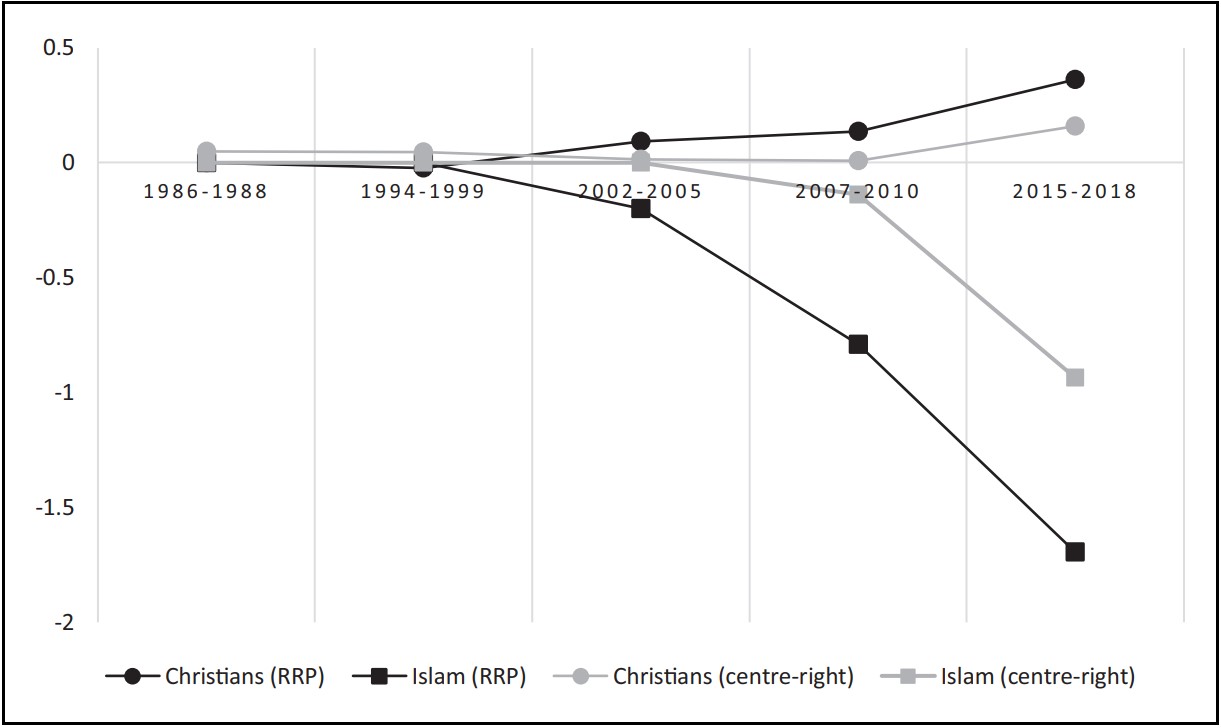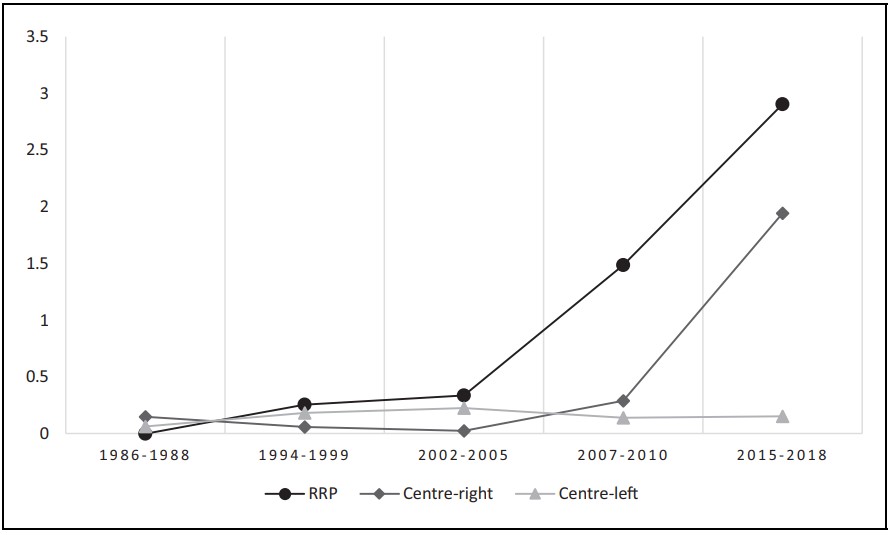Are European party systems experiencing the emergence of a 'new' religious cleavage originating from the exclusion of Islam? In a study recently published in Party Politics, Jakob Schwörer and Belén Fernandez-García show how religious discourses have increased substantially among radical right parties since the turn of the century and that nativist out-group constructions are a crucial driver for positive references to Christianity and secularism.

In March 2020, C-REX visiting fellow Jakob Schwörer and Xavier Romero-Vidal published a post on the C-Rex blog about their latest publication in Religion, State and Society. In their cross-sectional study, they compared religious references of political parties in seven Western European countries, concluding that religious discourses mostly consist of a rejection of Islam and hardly of pro-Christian messages as widely assumed in the literature. Together with Belén Fernandez-García from Lisbon University, Jakob Schwörer now published a longitudinal analysis in Party Politics investigating how religiously framed discourses developed over time since the 1980s and whether religion is "on the rise" as claimed by several scholars. Their findings indicate that religious discourses increase substantially among radical right parties since the turn of the century and that we experience the evolution of a new religious cleavage deriving from nativist out-group constructions leading to positive references to Christianity and secularism.
Assessing the new role of religion in politics
Religious references in party politics traditionally trace back to the conflict between religious forces defending Christian and church interests and secular efforts to reduce the influence of the church on the state. This original cleavage lost importance in the 20th century and Western European states have mostly become secularised. With the September 11 attacks, further terrorist events and the arrival of Muslim migrants to Europe, the radical right is expected to increasingly refer to Islam as a religious out-group threatening the secular nature of "Christian" Europe. Despite the fact that Christian churches still have a larger impact on European societies than Islam, today's religious conflict is framed as a battle between secularism and Christianity unified on the one side and Islam as non-native counterpart on the other threatening the secular and Christian values. In this context, scholars assume a "rise of religion" in party politics due to the discovery of religious and secular references among the radical right.
Our study attempts to trace the development of anti-Islam, pro-Christian and secular messages as well as discourses towards freedom of religion and religious diversity in five Western European countries since the 1980's. We provide empirical evidence for widespread assumptions within academic literature about the rise of these discourses in the new millennium in Italy, Austria, Switzerland, France and the UK. Conducting a partially dictionary-based quantitative content analysis of election manifestos of radical right and mainstream parties, we measure positive and negative evaluations of Christianity, Islam, secularism and freedom of religion.
Empirical evidence: The evolution of a new religious cleavage
Mostly in line with assumptions from the literature, Islam became a main non-native out-group for the radical right between 2007 and 2018. On average, we see a linear growth of anti-Muslim messages in election manifestos since the turn of the century. Yet, our findings indicate that 9/11 did not shift political discourses immediately as often argued by scholars: In election manifestos shortly after the September 11 attacks, Islam is hardly constructed as a threat for the native society. We made similar observations for discourses about Christianity. While Christian values played no role in manifestos of the radical right before the turn of the century, all parties under examination referred positively to Christianity in at least one of their manifestos between 2007 and 2018. However, references to Christianity are less widespread than references to Islam - except the SVP in Switzerland. Furthermore, we could not find a linear increase in pro-Christian discourses but rather a sporadic use.

Secular references are increasingly used as well after 9/11 with the exception of the Austrian FPÖ. Especially between 2007 and 2018, far right parties evaluate secularism in a positive way while this was not the case in the 1980's and 90's. They mostly support secular arguments, which, however, are explicitly or implicitly articulated in order to exclude Islam. We observe a similar trend regarding the salience and evaluation of religious diversity and freedom. Before the turn of the century, religious freedom was no issue for the radical right. Only since 2007, the radical right takes a critical stance highlighting the limits of freedom of religion and questioning the legitimacy of non-Christian religions, in particular Islam.
Hence, we observe an increase in religious references among all measured religious dimensions since the 21st century. Therefore, we assume the emergence of a new religious cleavage originating from the radical right's exclusion of Islam: Pro-Christian, pro-secular and anti-religious freedom discourses correlate strongly with anti-Islam messages indicating that all types of religious references used by radical right parties derive from their exclusion of Muslims.

Also the centre-right is increasingly engaged in anti-Islam discourses, yet mostly after the so-called "refugee crisis" in 2015. While most conservative parties reject Islamic fundamentalism, some of them - in particular the French and Austrian centre-right - also criticise moderate Islam. Thus, the increased salience of anti-Islam messages among the radical right, the electoral rise of the latter and increased immigration from Muslim immigrants might have influenced the discourses of the centre-right.
Implications: towards more religious polarization?
We found that anti-Islam messages and to a lower degree also pro-Christian, pro-secular and anti-religious freedom discourses constitute a discursive element of the far-right in the 21st century. While the traditional conflict between church and state has become less important, we experience the evolution of a new religious cleavage originating from the exclusion of Islam. Whether this cleavage will move towards more secularisation (Islam as a threat to secular Europe) or more religious polarisation (Islam as a threat to Christian Europe) is difficult to determine yet. However, while we clearly found that religious references increased in the new millennium, we should not overemphasise the religious dimensions of the far-right's discourses since they mostly emphasise on Islam. References to Christianity, secularism and religious diversity are no decisive communicative feature of radical right parties but should be understood as a precipitate of their preoccupation with Islam.






